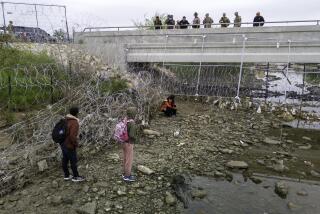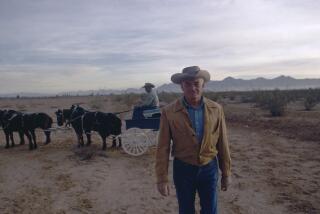As Times Get Hard, Boasting Goes Into Reverse : Texas Braggers Now Accentuating the Negative
- Share via
HOUSTON — On the eighth day, as folks around here say, God created Texas. On the ninth, Texans started bragging.
There is the one about the Texan who was sending his son off to school in the East:
“Son,” he said, “don’t ask a man where he’s from. If he’s from Texas, you’ll know soon enough. If he isn’t, you don’t want to embarrass him.”
Little Ol’ Bedbug
Or the one about the Texan visiting Maine who belittled every scenic wonder he was shown. His host, in exasperation, slipped a huge lobster into his bed. When the Texan pulled down the covers and saw the lobster crawling about, he gasped and called his host to the bedroom.
“What in tarnation is that?” asked the Texan.
“That’s a Maine bedbug,” said the Yankee.
The Texan studied the lobster closely. “Yea, it’s a young’un, ain’t it?” he asked.
That, folks, is bragging--Texas bragging. The biggest. The best. The most.
Alaska Dismissed
Bragging and Texas have been partners for so long, they are almost inseparable--like Cisco and Pancho, Tracy and Hepburn. Not even Alaska got much in the way after it replaced Texas as the largest state. The way Texans saw it, you could melt down most of the dern state anyway, and a drink isn’t measured by its ice cubes.
But now Texas is in the grip of hard times. Trouble in the oil patch has sent the economy plunging right off the charts. With things so bad here, isn’t bragging as extinct as the dodo bird?
Not at all. Wily Texans learned long ago how to shift gears at times like these and go into reverse bragging. The trend these days is to poke fun at the Texas bust:
--The difference between a pigeon and a Texas oilman is that a pigeon can still make a deposit on a Mercedes.
--How do you make a small fortune in Texas oil? Start with a big one.
--What do you call a petroleum geologist? Hey, waiter!
--A Texas bank is giving away a toaster or an oil well if you open an account. Everybody’s taking the toasters.
An Act of God?
Bob Murphey, a lawyer from Nacogdoches who makes much of his living regaling audiences with Texas stories, tells this one:
A Texas farmer in the Panhandle was struck by lightning and killed. His wife demanded double indemnity from the insurance company, claiming her husband’s death was an act of God. The insurance company said it wasn’t, and the case went all the way to the U.S. Supreme Court. The court ruled in favor of the insurance company, saying, “Getting struck by lightning is an act of God. But an act of God that happens in Texas is a pure accident.”
Texas these days is much like the farmer, and the lightning is the Organization of Petroleum Exporting Countries, which flooded the market with oil and sent prices on a swan dive.
That has produced some jokes that really have a reverse brag as their point:
A Texas oilman who had been turned into a frog asked a fair damsel to kiss him and end the spell. The damsel put the frog in her pocket instead. “These days, a talking frog is worth more than a Texas oilman,” she explained.
Positive Boasting Survives
Lean as times may be here now, most Texans believe there is still room for some positive boasting. “I think the bragging will be subdued, but it is alive and healthy,” said Texas historian T.R. Fehrenbach. “There’s plenty to brag about.”
Texas still has the biggest and most of a lot of things. Despite the fact that it’s not doing the state much good these days, Texas leads the nation in the production of crude oil. It ranks first in the number of farms and ranches, cattle, sheep, goats, wool production, mohair, cotton, watermelons, spinach, hides and tallow. It has more miles of roads than any other state, and the tallest capitol building in the country, taller by seven feet than that one over in Washington, D.C. The margarita, Dr Pepper and Fritos were invented here. It has Priscilla, the life-saving swimming pig. Priscilla once saved a drowning child in a lake and now does personal appearances and product endorsements.
Still Better Than Iowa
Writer Dan Jenkins, most noted for his book “Semi-Tough,” says all that still leaves out the things he thinks Texas should be bragging about the most.
“The thing I always thought Texas should be proud of the most is Mexican food, barbecue and chicken-fried steak,” he said. “They haven’t had a hell of a lot to brag about lately. But they have more to brag about than Iowa.”
Much of the credit for spreading the word about Texans’ boasting ability should go to John Randolph, who put it between the covers of a pamphlet. Randolph, an advertising man, developed a series of “Texas Brags” ads just before World War II for Jax beer in Houston. The ads, which appeared on buses, were a huge success.
Booklet of Brags
In 1944, while Randolph was stationed with the U.S. cavalry in Marfa, Tex., he decided to expand on his brags, sent for his notes and clippings from the Jax campaign and came up with a 62-page booklet that was to become Texas’ best-selling souvenir. By the time of his death in 1972, more than 1 million copies had been sold.
A typical example:
“Texas occupies all of the continent of North America except for a small part set aside for the United States, Canada and Mexico.”
Like all good Texans, Randolph understood the value of the reverse brag:
“There are creek beds that stay dry so much of the time that it is easier to find bird nests in them than fish. There are areas so flat that they have to put up signs to tell the water which way to run when it rains.”
Who Started It All?
How did Texas bragging get started? John Henry Falk, folklorist and raconteur, has one theory.
“I think it started with ol’ Cabeza de Vaca,” said Falk. According to his genial analysis, Alvar Nunez Cabeza de Vaca, who was shipwrecked off the Texas coast in the 16th Century, spent years walking back to Mexico City. Not wanting to make it sound like the trip had been a total bust, he told of cities of gold.
“He made up a whole bunch of yarns about what he had seen in Texas, and everyone else has been following suit since then,” he said. “People didn’t want to say they got hooked too.”
Others lay the beginnings of Texas bragging to the early hard-scrabble times in the state. Fehrenbach, the historian, said it is a sense of history, as well as the self-image of Texans, that led to bragging.
Strong Feeling of History
“Texas does have a history, whereas most states have (only) a history of economic development,” he said. “There’s a strong feeling for history. As you go to the smaller communities, there’s a very strong consciousness or feeling with the land. There’s a form of exaggerated patriotism you’d find in the French and Russian peasants.”
But, Fehrenbach says, there was also a feeling among Texans that they were not quite like other people, that they were always too busy taking big risks, getting things done, to smooth off the rough edges. That, in turn, led to the self-deprecatory humor that often took the form of bragging.
Barbarians, but Not Mean
“Texans have always had the image of being semi-barbarians,” he said. “ . . . The image was of a big hat and a cigar--not a mean barbarian, but an uncouth barbarian.”
Larry McMurtry, a Texan who won the Pulitzer Prize last year for his novel “Lonesome Dove”--a tale of two aging Texas Rangers on a cattle drive to Montana--believes there is no such thing as a strictly Texas brag. He contends, instead, that bragging was a common literary tool of the late 19th Century that Texans on the frontier used as a form of story-telling. If there was an Indian raid, it would be bigger with each recounting. Droughts would be drier. Tornadoes would be more destructive.
Stanley Marsh 3 (not III but 3) agrees. Marsh, among other things, has the distinction of being the man who buried 10 Cadillacs, tail fins up, along the road on his property outside Amarillo. He is a true Texan, a loyal Texan, and a character to boot.
Just because Texans are down, he says, does not mean they’re out.
“Our heroes are people who hit it big by taking big risks,” he said. ‘They’re more fun to be around.”
More to Read
Sign up for Essential California
The most important California stories and recommendations in your inbox every morning.
You may occasionally receive promotional content from the Los Angeles Times.










